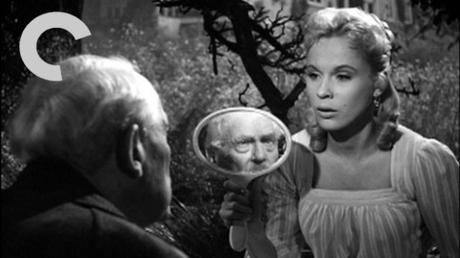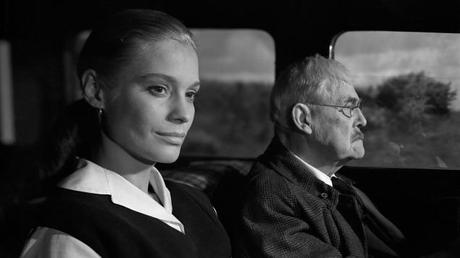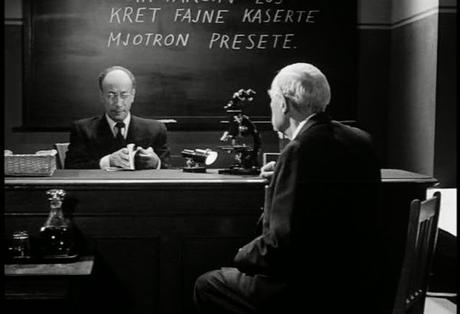Criterion Movie of the Month: 'Wild Strawberries'

Earlier this year, I wrote a review of Mikey and Nicky , one of the newer additions to the Criterion Collection. It was included as the first watch on a beta release of the Criterion's personal streaming service. They released a movie a week for those who paid upfront during announcement, which I did. Bugs in those first few features stopped me from watching and reviewing the rest of them, so I couldn't do a Criterion Channel Movie of the Week for every Week. But it is still something I want to do in some form, so I'm changing it to Criterion Movie of the Month, as I work through some of the most influential, important, and artistically accomplished movies of all time.
I'm starting this off with Wild Strawberries , my third feature from Ingmar Bergman. Bergman, if you don't know, is one of the most influential directors of all time. If there was a Mount Rushmore of Cinema, he would be one of the four. The first feature of his I ever saw was The Seventh Seal , which you've probably heard about it. It's the one where a crusader, played by Max von Sydow, plays chess with Death, literally. In an interview with , Bergman said, "I don't want to make merely intellectual films. I want audiences to feel, to sense my films." Of the few I have seen, they do cleverly question morality and identity, but they only offer abstract sensations as answer, which oddly feel more satisfying than you would think.
It's also worth noting, as covered by documentary Bergman: A Year in a Life , Bergman had some problematic behavior when it came to women. I don't know the specifics because I haven't seen the doc, but it focuses on his "mad year," 1957, when both Seventh Seal and Wild Strawberries were made. Even without specifics, just knowing that he had something to apologize for helps understand the existential journey he puts his main character, Isak, on.

Isak, played by legendary director of The Phantom Carriage , Victor Sjöström, is a 78 year old widower and physician, specializing in bacteriology. He lives mostly alone with his loyal housekeeper and is described by his daughter-in-law, Marianne, as a lonely grouch who acts in fake niceties. Her relationship to his son has been stressed by a loan Isak gave them and expected returned despite his comfort with wealth. It is the night before he is set to return to his old university to receive his Doctor Jubilarius, a special degree given to those who have held a doctorate for 50 years. He is awakened by a nightmare where he sees his own dead body and makes the rash decision to drive from Sweden to Lund instead of flying. He is accompanied by his daughter-in-law, who'd rather he didn't go alone. That nightmare will not be the only dream he has over the course of this movie.
The car ride is made up mostly of interpersonal discussions between Isak and a variety of passengers. On his way, he picks up two different groups of hitchhikers. One group is a youthful trio, the young lady of which reminds Isak of his first love, Sara. When he first lays eyes on her, he is immediately transported back to his younger days in a daydream. He watches as Sara picks strawberries to gift Isak's deaf relative. She is interrupted by Isak's brother, Sigfrid, who we later learn she married and started a family with. Isak acts as if he has been betrayed by Sara and Sigfrid and recalls these events mostly with contempt. However, the longer the day dream goes on, the less concerned he seems. Sara goes from struggling physically with Isak's brother while declaring her loyalty (not love) to Isak, to struggling with her love for Sigfrid for the sake of Isak's feelings. In a scene that can't be a memory, Isak watches as Sara cries over Sigfrid having her heart even though she was already promised to Isak. This is Isak's daydream, a fantasy, and in it, he imagines Sara caring about him even at the possible detriment of her own future. Sara went on to have a successful marriage and family with Sigfrid. It is a happiness that would have been sacrificed for her to remain loyal to Isak, and Isak finally seems to see that. It would have been the same kind of hollow niceness that Marianne had already criticized him for trading in if Sara were to give that up.
The other group is a married couple, a loud-mouthed husband berating his wife for distracting him and causing them to flip his car. The husband becomes the inspiration for an examiner in a dream Isak has. Back in school, Isak is failing an examination, which he doesn't quite understand, like Kafka's . The rules are unclear, and the punishment makes no sense. The examiner ends by showing him a vision of Isak's wife Karin being sexually assaulted in the woods. The examiner notes Isak stood in "this very spot" when he watched it all happen and heard everything the man and woman said. Karin's response to the whole thing was especially biting because it was all about how Isak is so cold that he won't even pretend to care that this had happened. I can only imagine that it is Isak's biggest secret, most shameful sin. Something he is afraid others to find out which is why it becomes the subject of an impromptu scholastic examination that threatens the only thing of pride he has, which is his education. He seems to learn that his unhappiness is his own undoing thanks to shallow pursuits and empty reflection.

I think this shows that his guilt is growing in response to Marianne's criticisms. Her accusation of him not ever really caring about being nice has resonated through the whole movie and colored every interaction he has, none as much as one of the chance encounters he has between both of these dream sequences. They stop for gas and are greeted with out of the ordinary warmth from the station owner and his wife. They immediately recognize Isak, even though he doesn't recognize them, as a physician who pulled off what they consider a medical miracle for their family. They fawn over him and refuse his money. They even tell him if their expected child is born a boy, they'll name him after the doctor. In a state of vulnerability, Isak seems completely taken aback by this sincerity, as if he's feeling it for the first time.
Receiving his doctorate award becomes just another stop over point. It's what the whole movie has been working toward, and a lesser movie might give him a sudden faux-inspirational speech about what is really important, styled as if he is coming up with it off the cuff. Bergman doesn't do that. Bergman instead puts Isak to bed, to dream of his childhood once again and try but fail to end the bitter feud over money with his son. It might be too late for Isak to do anything about it, but he finds a satisfying piece of mind. That's still worth something.
Way back in 1916, a movie called Intolerance: Love's Struggle Through the Ages was released by D.W. Griffith. It was three and a half hours long, featuring four intercut stories of unjust intolerance leading to the downfall of civilization. Griffith made this in response to critics of his movie the previous year, The Birth of a Nation , which glorified the KKK and perpetuated racial stereotypes. (That's right, The Birth of a Nation had critics in its day. Don't always believe the "It was a different time" bullshit). He made it not as an apology but as self-defense, painting himself as the unjustly targeted person in each of the stories and how everyone else were the intolerant ones. (That's right, this excuse has been around for a long time). Wild Strawberries feels like Bergman's Intolerance . However, it is neither apology or self-defense but rather a sincere introspection of one's character flaws.
Introspection always comes easier when facing death, and a widower, pushing 80, and receiving lifetime achievement awards certainly has death on the brain. The same cannot be said for Bergman. In 1957, Bergman turned 39, not quite over the hill just yet, but he wrote and styled this movie with the dignity and weariness of a much older man. That's quite an accomplishment. No forgiveness (well, that's up to you). No forgetting. But like Bergman said, lots of feelings.


